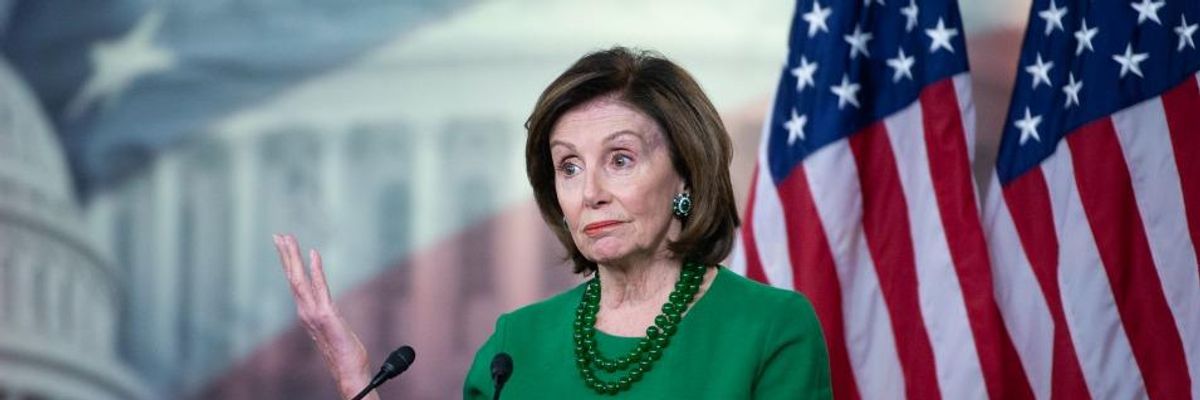Progressives and political journalists were not the only observers pointing out glaring weaknesses in the coronavirus relief bill pushed by House Democrats--as the U.S. Senate took up the legislation, at least two Senate Republicans said publicly that bolder initiatives offering direct assistance to Americans during the pandemic should be included in a relief package.
"Every American adult should immediately receive $1,000 to help ensure families and workers can meet their short-term obligations and increase spending in the economy," Sen. Mitt Romney (R-Utah) said Monday.
Arkansas Republican Sen. Tom Cotton also said House Democrats were insufficiently ambitious in their plan to assist Americans, officially called the Families First Coronavirus Response Act.
The bill includes free coronavirus testing for all Americans, strengthened nutritional assistance and unemployment programs, and paid sick leave--but leaves millions of Americans out of the latter provision, allowing large companies employing more than 500 people to forgo paid sick leave for workers.
"The House relief bill doesn't go far enough and fast enough," Cotton tweeted. "We're going to do everything we can to get cash into the hands of affected workers and families as quickly as possible so we can all get through this pandemic together."
Cotton appeared on Fox News to express his views on the bill:
"If you've got the virus, if you've been quarantined because you've been exposed to the virus, if your business has been shut down, or even if you have to stay home to care for a child because school is closed, you should not worry about buying the groceries, paying the car payments, paying your rent," Cotton said, echoing sentiments expressed recently by progressives including Sen. Bernie Sanders (I-Vt.) and Rep. Alexandria Ocasio-Cortez (D-N.Y.).
The comments from Romney and Cotton drew the attention of Sanders' senior policy advisor, Alex Jacquez.
The final House bill was passed Friday night after negotiations between House Speaker Nancy Pelosi and Treasury Secretary Steve Mnuchin--resulting in some compromises which Eileen Appelbaum, co-director of the Center for Economic and Policy Research (CEPR), called "egregious" in an op-ed published Monday at Common Dreams.
"The [paid sick leave provision] excludes workers at big companies like Whole Foods and McDonald's as well as those at Walmart and Target, whose CEOs appeared with President Trump on Friday afternoon as he declared a national health emergency," Appelbaum wrote, suggesting that such concessions to the White House may not even have been necessary in the midst of a global and national public health crisis:
It's not possible to know what would have happened if House Democrats had not engaged in negotiations with the Trump administration over the bill. The original bill could have passed in the House even without the support of Republicans, although it is likely that some may have voted for it. But what about the Republican-controlled Senate? GOP senators were wary of returning to their districts without passing something that would protect the public's health and that would bailout their constituents. It is not difficult to imagine that some would have broken with the administration and voted for a more robust bill without carve outs for big employers.
Journalist Adam Johnson of The Appeal viewed Romney's and Cotton's calls for more far-reaching assistance with skepticism and denounced Pelosi for giving Republicans the opportunity to cast themselves as being firmly on the side of working Americans.
"They're obviously cynical phonies but this is what happens when the most powerful Democrat in the country is a conservative deficit scold who constantly nickel and dimes emergency relief bills during a mass crisis," Johnson tweeted.
While acknowledging that the Republicans' comments suggested that "the political ground is shifting very, very fast" regarding support needed for Americans, Ryan Cooper of The Week also criticized the Democratic leaders for failing to fight for workers themselves.
Ocasio-Cortez warned that with Republicans joining the national conversation about direct assistance to Americans, political observers should be wary of right-wing and liberatarian approaches to universal basic income (UBI), which often hinge on eliminating other government programs like nutritional and housing assistance.
"Not every UBI policy is created equal," Ocasio-Cortez said. "Some are structured in predatory ways to gut the safety net and reward banks, others are better with people's well-being in mind. Be careful."




